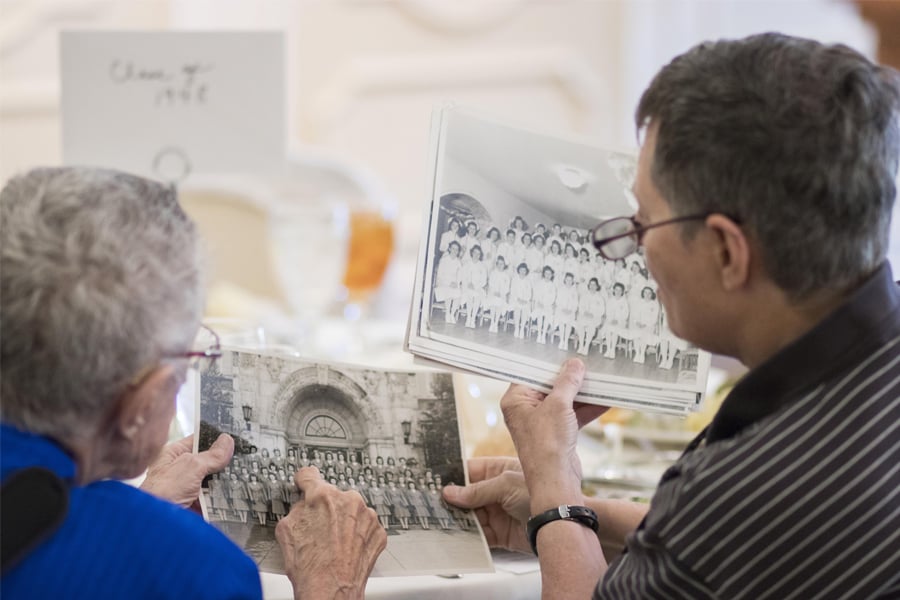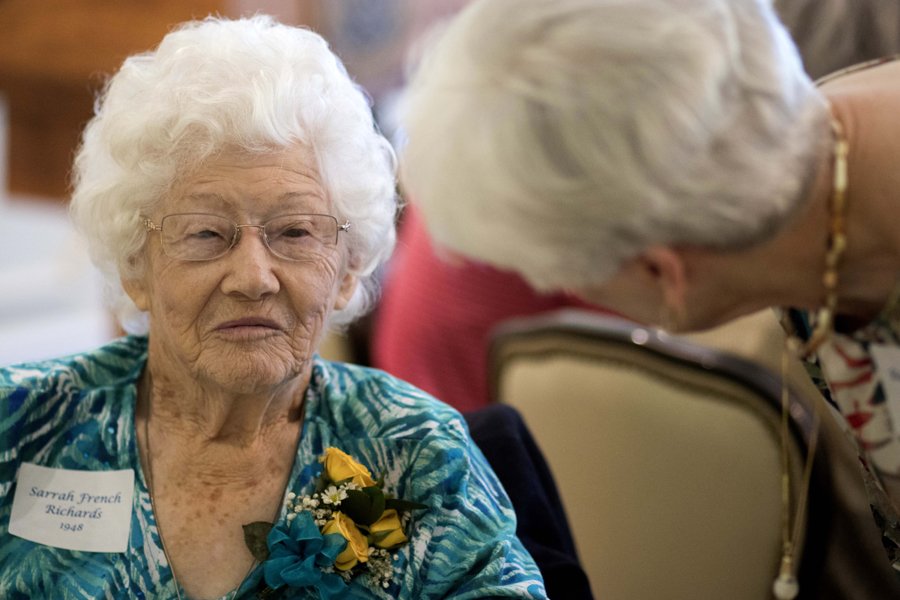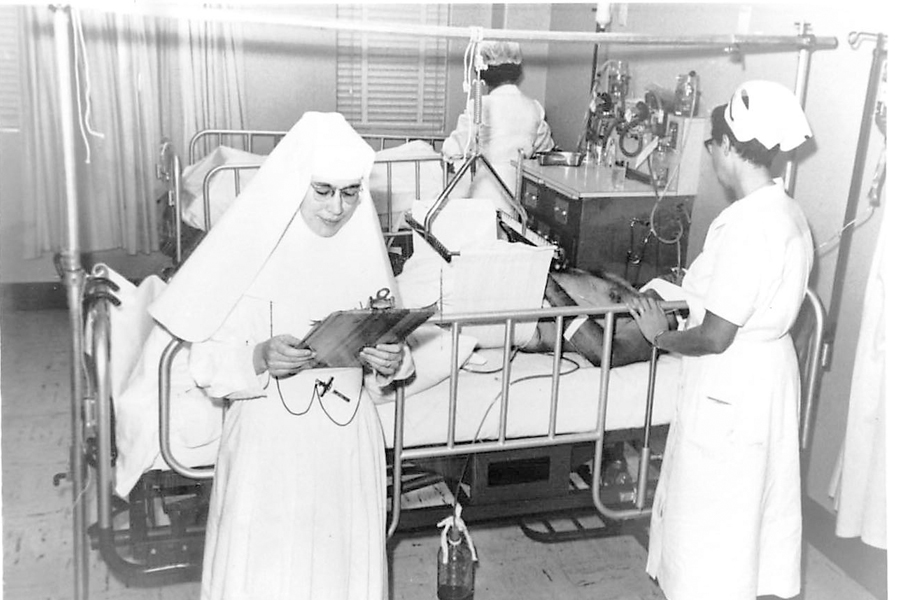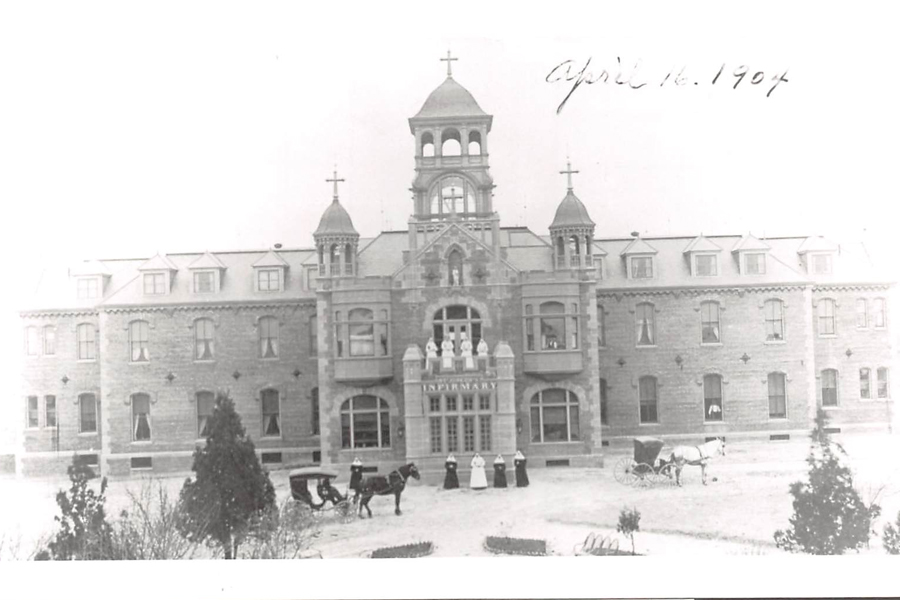St. Joseph nurse alumni disband with final act of charity

Rhoda Stetson Ramsbottom points at a picture of nursing students during the St. Joseph Hospital School of Nursing Alumnae Association homecoming June 9 at Colonial Country Club. (NTC photo/Jayme Shedenhelm)
FORT WORTH — From the time she was a tyke growing up in rural East Texas, Sarrah “Frenchie” Richards modeled the strong, selfless virtues of a nurse.
“I was just nurturing,” said the 95-year-old who remembers caring for the cats and other animals who wandered onto the family farm.
After her mother died, the compassionate youngster suddenly became responsible for the needs of two siblings — a five-month-old baby and a toddler. She was only 11.
“My daddy helped me but that’s all the help we had,” Richards recalled. “Taking care of children made me want to do more. It’s always been in my heart to help people.”
So, no one was surprised when the dependable farm girl decided to enroll in St. Joseph’s School of Nursing. Founded in 1906 by the Sisters of Charity of the Incarnate Word, the hospital-based diploma school had a reputation for producing educated nurses who performed well in the workplace. The San Antonio-based religious order purchased Tarrant County’s first hospital, the Missouri Pacific Hospital, from its railroad owners in 1889 for $15,000. They renamed it in honor of St. Joseph, patron saint of the dying.
Throughout its history, the hospital offered substantial health services to those who could not pay. The first patient the sisters admitted to the hospital was a charity case.
“I was Baptist, but a good friend told me it was one of the best schools around so that’s where I went,” continued Richards, a member of the class of 1948 and a much-loved, well-respected surgical nurse at Fort Worth’s only Catholic hospital for 40 years. “The sisters I worked with were just precious.”

Sarrah "Frenchie" Richards speaks with Barbara Ward Hinds during the St. Joseph Hospital School of Nursing Alumnae Association homecoming June 9. (NTC photo/Jayme Shedenhelm)
Sold by the Sisters of Charity in 1994, the hospital was closed the following year by its new owners. Later repurposed as an Alzheimer’s center, the red brick, 12-story structure was demolished in 2013.
Although St. Joseph Hospital no longer exists, the School of Nursing graduates, who witnessed the beginning and end of life within its walls, have never forgotten the generous spirit of service exemplified by the Sisters of Charity. Since it was started in 1920, the school’s alumnae association has given away more than $75,000 in scholarships to worthy nursing students. Funds were amassed primarily through donations from St. Joseph graduates or memorial donations from families and friends.
But, faced with a dwindling membership, the alumnae association was forced to make a decision about its future, according to the organization’s president, Verna Wells “Bunny” McDonald. More than 100 nurses and anesthetists, who trained at St. Joseph Hospital, attended the final homecoming luncheon June 9 at the Colonial Country Club in Fort Worth.
“We needed to bring this to a conclusion,” explained the Lubbock native whose career in nursing was inspired by the Cherry Ames nurse book series. “It was just time. We want to look toward the future.”
The association is disbanding but the memories and friendships remain.
“Why are the girls we met at nursing school special? We grew up together,” McDonald enthused. “Most of us had never witnessed a birth or a death. We were so ‘green’ when we started and ripe for new experiences when we graduated.”

Nurses and Sisters of Charity of the Incarnate Word are seen in the St. Joseph Hospital ICU in this 1950 picture. (NTC archives)
The organization’s philanthropy will also continue. Money remaining in the alumnae association’s treasury will fund an endowment scholarship for nursing students at the University of the Incarnate Word. The nursing school’s history and close ties to the Sisters of Charity of the Incarnate Word made the decision an easy one.
Standing in a room crowded with longtime friends and classmates, McDonald thanked the forward-looking sisters who established St. Joseph’s Training School for Nursing shortly after the turn of the 20th century.
“Many graduates have gone on to be God’s hands and feet through their work caring for the ill and the infirmed,” she said. “Our hearts are heavy as we feel the finality, and yet our hearts are light knowing the future plan holds a great ability to do what the association stands for.”
Alex Castaneda, director of major gift and planned giving at the University of the Incarnate Word, explained how the $25,000 endowed gift would promote the education of future nurses. Eighty-eight nursing majors were part of the university’s Class of 2018.
“While it’s sad the organization is closing, your work and legacy will continue,” she assured. “Our nursing students have a 100 percent pass rate in state exams. Your gift is a sound investment in their careers and the impact they will have in their community.”
Before baccalaureate and associate degree programs became the preferred way to train nurses, St. Joseph’s school graduated women — and a few men — who went on to practice the profession in a variety of ways. During WWII, many students joined the Cadet Nurse Corps, then served in the Armed Forces.

A view of the exterior of St. Joseph's Hospital - then St. Joseph's Infirmary - in 1904. By 1993, St. Joseph had a general staff of 1,000 employees and 475 patient beds. The Sisters of Charity of the Incarnate Word sold the hospital in 1994. (NTC archives)
Owedia “Tweedie” Searcy attended Texas Christian University before graduating from St. Joseph’s School of Nursing in 1945. After becoming certified as a nurse anesthetist, she joined the U.S. Navy and was one of five nurses who established a station hospital in Saigon early in the Vietnam conflict. Her experiences are chronicled in the book Station Hospital Saigon: A Navy Nurse in Vietnam by Bobbi Hovis.
Visitors to the Sheppard Air Force Base Hall of Heroes will find a display honoring retired Col. Rita Vokes. A member of the class of 1967, she served in the Air Force for 27 years.
Sister Mary Elaine Breen, SSMN, began taking classes at St. Joseph Hospital in 1957 and became a registered nurse in 1960. Her medical knowledge was a useful resource in the Congo missions where she worked as a midwife in the early 1960s and later at her order’s dispensary and hospital in Rwanda, Africa.
Closer to home, Catherine Schwind-Meyer, class of 1959, worked as a school nurse at Our Lady of Victory and Nolan Catholic High School for 16 years.
“Growing up, I either wanted to be a hairdresser or nurse,” she said. “I’m glad I chose nursing. It’s satisfying to know you’re helping others.”
Joyce Keene Wood withdrew from a vocational program in Odessa to enroll in St. Joseph’s nursing school because it accepted married students. The St. George parishioner was director of the school’s anesthesia program and worked as a nurse anesthetist at St. Joseph Hospital until the doors closed.
“Wherever our graduates went in their careers and in the world, they were always tied to their nursing roots at St. Joseph Hospital,” said Barbara Hinds, the alumnae association’s treasurer. “Our final luncheon was a bittersweet day. We’re sad our association is ending but happy and thankful for the many years of friendship and service.”
